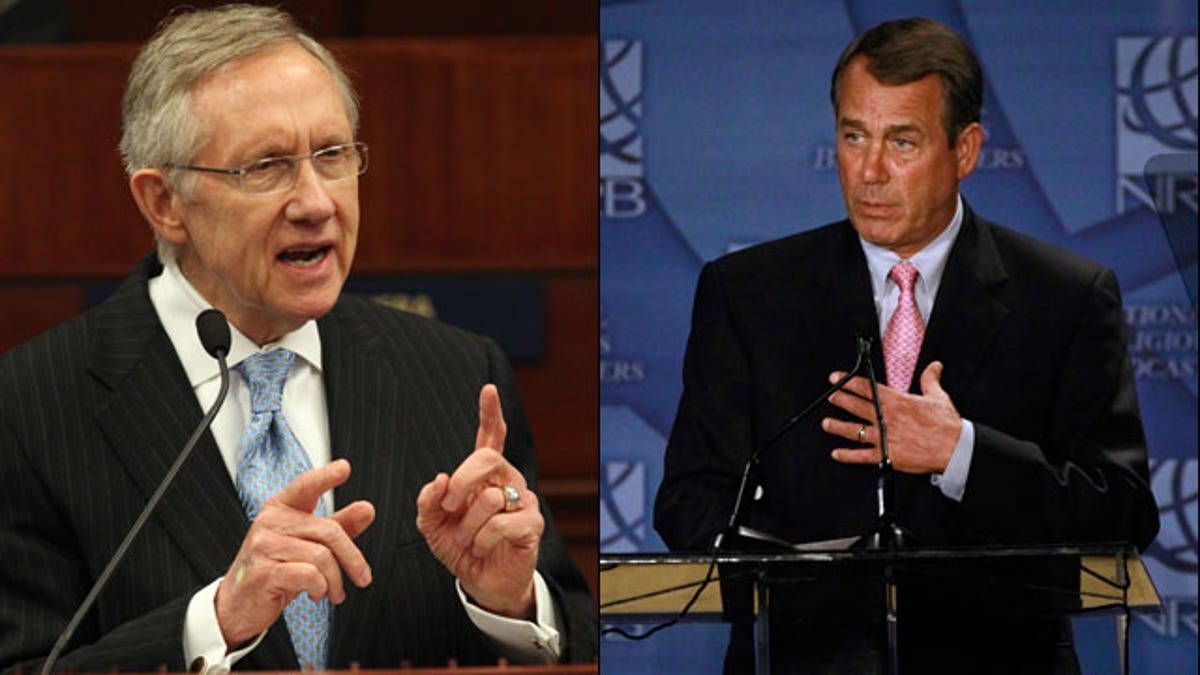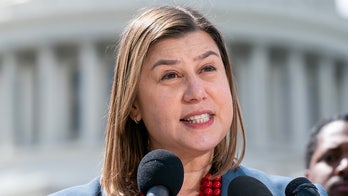
Senate Majority Leader Harry Reid and House Speaker John Boehner are at loggerheads over a GOP stopgap measure that would slash $61 billion in federal spending and keep the government funded through September. (AP)
Lawmakers entered what could well be a merry-go-round of negotiations over spending cuts Thursday, raising concerns that Washington is pushing off the big decisions with short-term agreements while other problems fester.
Ahead of a high-profit budget summit, the White House said Thursday afternoon that Democrats would be willing to put more cuts on the table -- another $6 billion, according to National Economic Council Director Gene Sperling.
One GOP aide estimated that put the Democrats' total offering at about $10 billion. "That's it?" the aide said.
The initial joust signals that more short-term agreements will be needed before the two parties can come together on a spending package for the rest of the year. It only complicates a debate that gets more confusing and contentious by the day.
Vice President Biden offered no clues as to what comes next, issuing an ultra-brief statement after the meeting saying: "We had a good meeting, and the conversation will continue."
The goalposts in the budget debate keep moving. After Republicans swept into office on, among other things, a pledge to initially cut spending by $100 billion, GOP leaders proposed a plan for the rest of 2011 that fell far short of that. Then they offered a new plan to cut $61 billion from last year's levels, under pressure from Tea Party freshmen.
But that bill, after passing the House, is stuck in the Senate and lawmakers are in the meantime negotiating short-term extensions -- adding layer upon layer to the budget debate, kind of like dreams within dreams in the hit movie "Inception." While they struggle to bust through those layers and deal with substantive discussions about spending, the nation's debt is creeping ever closer, once again, to its ceiling as other policy challenges cry out for congressional attention -- among them a crisis in Libya, unemployment and border security.
President Obama signed a two-week spending bill cutting $4 billion Wednesday after it cleared Congress. But senior congressional aides on both sides of the aisle concede lawmakers will likely have to hammer out yet another stopgap extension while they figure out what to budget for the rest of 2011. House Republican Leader Eric Cantor said Thursday he'd be open to supporting more two-week budget bills, cutting $4 billion at a time.
Then comes the much-bigger debate over the 2012 budget.
Michael Franc, with the conservative Heritage Foundation, said the government is only creating more uncertainty -- on top of uncertainty over the tax code, health regulations and other areas -- by budgeting two weeks at a time.
"It's disruptive," he said, not just for the government agencies but the companies that contract with them. He warned that grant and contract funds could go into a holding pattern, and those applying for them might think twice.
Sal Russo, chief strategist with the Tea Party Express, said his group is not exactly tickled by what they're seeing out of Washington.
"We're not satisfied," he told FoxNews.com. "Their message from the last election, unequivocally, was government spending and debt has become excessive, unsustainable and it interferes with the ability of the economy to recover. ... So it's obvious (from) the fact the debate continues like this, there are a lot of people who haven't gotten the message."
Tea Party Nation founder Judson Phillips also sounded off on his organization's website, saying House Speaker John Boehner looks "like a fool."
Russo said more Republicans grasp the fiscal crisis than Democrats, but urged Republicans to more "aggressively" attack the problem.
But lawmakers on both sides of the aisle are voicing frustration with their own difficulty in breaking new ground. Tempers are flaring even as they claim to be finding a modicum of common ground.
Before the Senate passed the two-week extension, Boehner said Senate Majority Leader Harry Reid ""owes the American people an explanation" for not taking action on the original funding bill that passed the House and would cut $61 billion in federal spending.
Reid's spokesman immediately fired back, saying: "That's tough talk from someone who is being bossed around by a bunch of (freshmen)."
Thursday wasn't any better. With Republicans complaining that Democrats were not giving them anything to work with, the White House set up the meeting with Biden and bipartisan congressional leaders. Though Republicans accepted the invite, they kept expectations low and had nothing to say when it concluded.
Senate Republican Leader Mitch McConnell, on the Senate floor, mocked the White House for responding to Wednesday's vote with a meeting.
"Republicans are happy to go," he said. "But putting a meeting on the schedule doesn't change the fact that neither the White House nor a single Democrat in Congress has proposed a plan that would allow the government to remain open and that would respond to the voters by reining in spending. All we get is talk."
Senate Democrats were planning to come with a proposal that includes more spending cuts. Though Republicans were dismissive, the White House estimated the total cuts offered amount to about $51 billion.
But that includes $41 billion in savings when compared against the president's 2011 budget proposal, which was never enacted. The other $10 billion came from the $4 billion in the latest stopgap bill as well as an additional $6 billion.
Fox News' Trish Turner contributed to this report.




